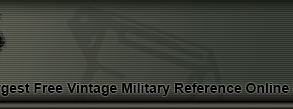The history of the German Hunting Cutlass -
Hunting has been a German tradition for a very long time. The proper management of national forests was a
key element to ensure that future generations could enjoy the natural resources in the future. The
National Hunting Association was the first organization in modern times created for the sole purpose
to control wooded areas and the animals that lived within.
The organization solved several problems faced by the nation's forests, including that of poaching.
Individuals could apply for membership. In order to gain it they would have to pass rigorous testing.
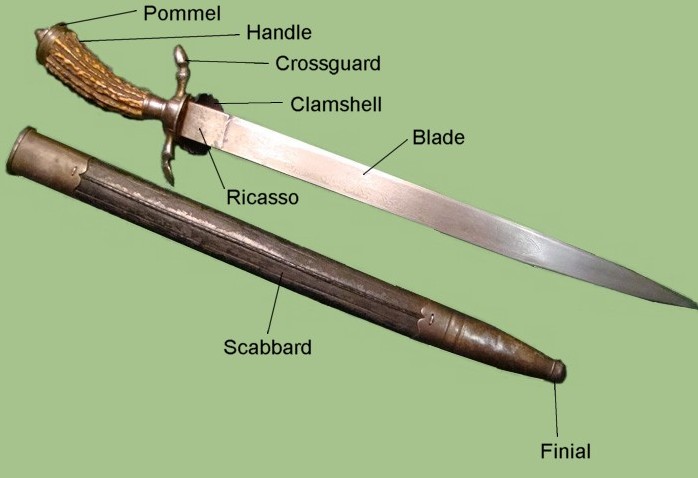
German hunters, like many others around the world, had carried knives into the field for practical purposes such as
skining or bleeding the fallen prey. These were working type knives. It was not until March of 1936 that dress
knives were introduced. These blades were design for appearance purposes only. A symbol of status rather than
functionality in the field.
The drerss knife was first issued to members of the German Hunting Association. Two patterns were created, one
type was known as the "regulation" while the oher was the "deluxe". The design of the knife was left up to the
owner's taste and financial ability. The fancier the knife the more expensive it became.
In January of 1937 a silver and gold knot was introduced for wear by all professional hunters. The knot was
a mark of distinction for all who wore it. The knot has a rope that wraps around the handle and ends in a
large cylindrical shape.
THE SCABBARD
The scabbards consisted of a metal throat and finial. The mid portion was made of leather, usually brown or
black. Heavy white cotton stiching was applied to one side in order to close the leather. The metal fittings
were often decorated with various types of designs. Some were very elaborate while others were plain.

THE BLADE
The blade of the cutlass could have been of single or double edge. The same criteria goes for the hunting knives.
Many of the blade of the Hunting Cutlasses were richly engraved with imagery of forests, hunters and prey. In some
instances even the knives had designs etched on the blade. Most of the time both sides of the blade were
decorated. The manufacturer's logo was placed near the base on one side.
It is important to note that not all the cutlasses and knives had fancy blades. Some of them were plain. The
following photographs illustrate two different types of blades.


THE HANDLE
The hunting cutlasses came with a variety of handles. The early examples were manufactured of stag horn. The designs
could be very simple of complimented with the use of metal fittings such as those in the shape of acorns. Three
examples of handles are shown below.
MANUFACTURER MARKINGS
The following is a list of some of the companies that manufactured the Hunting Cutlasses during WWII and earlier.
It is important to note that this may not be a complete list as it is possible that others manufacturers exist.
| Count |
Unique Makers |
Company |
Description |
Logo |
Comments |
| 1 |
1 |
Eickhorn |
Squirrel inside double oval. Name above. City below. There are
multiple variations of this logo.
|
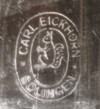 |
Solingen |
| 2 |
2 |
Erns Pack & Sohne |
Man wielding a weapon overhead. There are multiple variations of this logo.
|
 |
Solingen |
| 3 |
3 |
Alcoso |
Scale with letter ACS around it. There are multiple variations of this logo. |
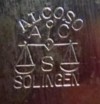 |
Solingen |
| 4 |
4 |
Emil Voos |
Coiled snake |
 |
Solingen |
| 5 |
5 |
Kumo Ritter |
Letters KR inside oval |
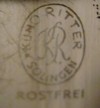 |
Solingen |
| 6 |
6 |
Anton Wingen Jr |
Knigt in armor standing up with arm back holding a sword. Name above. City below. |
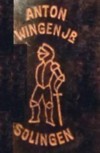 |
Solingen |
| 7 |
|
Anton Wingen Jr |
Knigt in armor standing up with arm back holding a sword. Initials above. City below. |
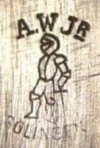 |
Solingen |
| 8 |
7 |
WKC |
Knight helmet facing left. There are multiple variations of this logo. |
 |
Solingen |
| 9 |
8 |
J. A. Henckels |
Two stick figures holding hands. |
n/a |
Solingen |
| 10 |
9 |
Clemen & Jung |
Shield with letter Z in center |
 |
Solingen |
This information is brought to you courtesy of
MilitaryItems.com.
The premiere provider of military collectibles to musuems, educational institutions and the general enthusiast.
|


